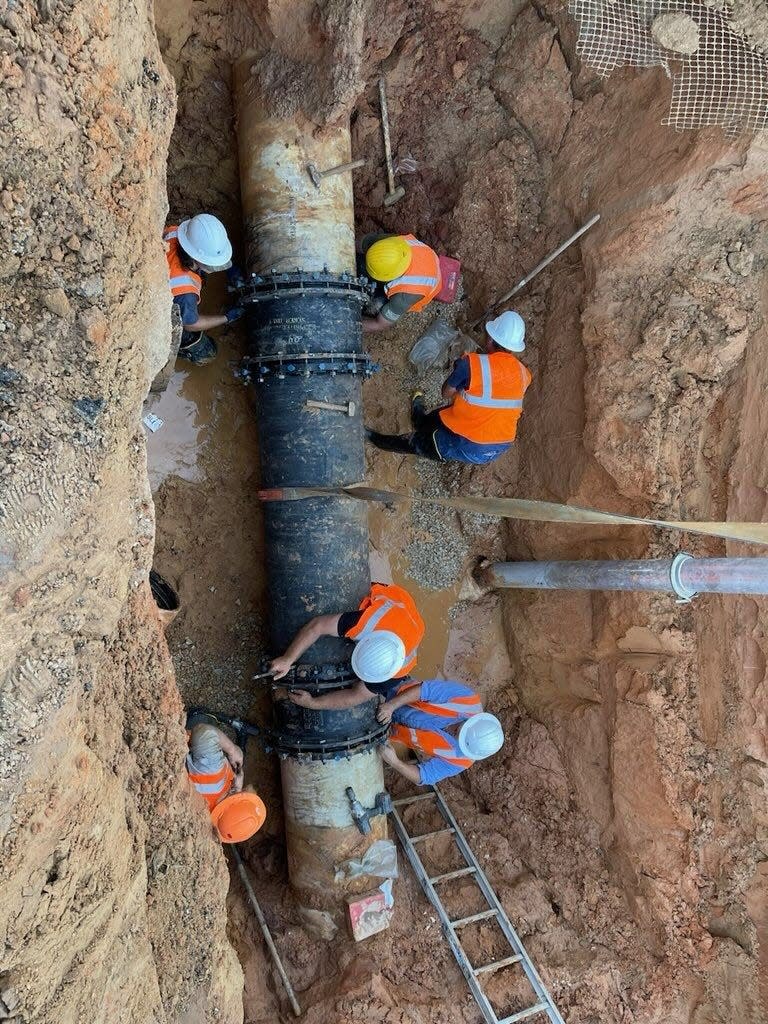City estimates almost a million gallons of sewage was spilled over the weekend

The City of Tallahassee estimates that almost a million gallons of sewage spewed into the streets and neighboring ditches and ponds after a main pipe burst Sunday.
While the city hasn't issued any kind of public update on the spill or its volume, city commissioners were notified in an email that roughly 970,000 gallons of "wastewater" were released as a result of the broken force main on Capital Circle Northeast near Mahan Drive.
This is the largest spill since June 2016 when 1 million gallons spilled during a power outage, said water quality watchdogs.
According to the email, other spills were triggered as they diverted the flow to another pipe. Approximately 700 gallons overflowed from a manhole, a pump station near Centerville Road spewed roughly 23,000 gallons into a storm water ditch and around 25 gallons were released from a cleanout on Doomar Drive.
"Crews worked through the night on repairs, cleanups, recovery and restoration," the city wrote. "Impacted areas are being cleaned and disinfected."
Underground Utilities and Public Infrastructure is conducting an analysis to determine the cause of the break. Water quality and e coli tests are also underway in nearby retention ponds.
On average, 17.5 million gallons of wastewater flow through a vast underground network of over 1,000 miles of pipes to the T.P. Smith Reclamation facility for treatment each day, according to a city analysis. About 40% of that sewage passes through the main pipe that burst over the weekend.
Heads up, drivers! There are lane closures on southbound CCNE from Automotive Way to Mahan that will continue through tomorrow, Monday. @abc27 @WFSUmedia @TDOnline @WCTV @gregtishshow @TLHReports https://t.co/A6Ci1Bbfxf
— City of Tallahassee (@CityofTLH) October 1, 2023
Between 2008 and 2018, 11 million gallons of raw, untreated sewage spilled into capital city streets, culverts, ditches, ponds and parking lots.
In 2011, the city entered into a consent order with the Florida Department of Environmental Protection. The order includes penalties for "untimely corrective action" when sanitary sewers overflow.
The voluntary agreement supervised by a court came after an increase in unauthorized spills from the wastewater system in 2007, 2008 and 2009. It requires the city to continually analyze the system, make repairs and take other action to improve the system's function.
At the beginning of September, the FDEP sent Tallahassee a notice stating the city owed a total of $26,750 in penalties for incidents this year. Since the beginning of January to Sept. 3 there have been 12 incidents the department is expecting payment for, including a 183,000 gallon spill on Jan. 4 at 2900 Meginnis Arm Road in northwest Tallahassee.
In lieu of paying the fines, the city is also able submit an in-kind project proposal that must cost at least one and a half times the penalty amount, which equates to $40,125.
With spills capturing headlines over the last few years, local advocates like Terry Ryan, co-founder of Tallahassee Sewage and Wakulla Basin Advocacy Group, are calling for change. Ryan said he thinks the city should provide residents with more information on things like how much sewage spilled and the status of contaminated sites.
"When is the City Commission going to be more transparent to the public and create new policies to be more transparent to its citizens?" Ryan said.
Elena Barrera can be reached at ebarrera@tallahassee.com. Follow her on Twitter @elenabarreraaa.
This article originally appeared on Tallahassee Democrat: Tallahassee estimates almost a million gallons of sewage spilled

